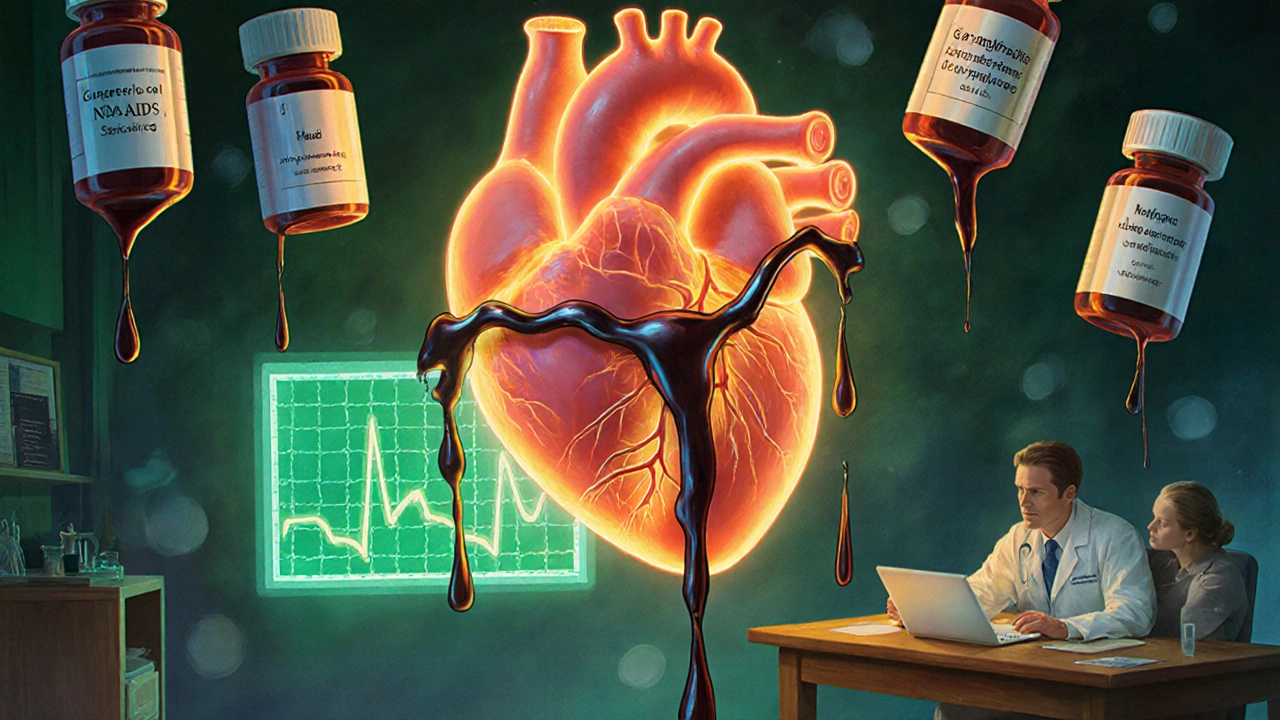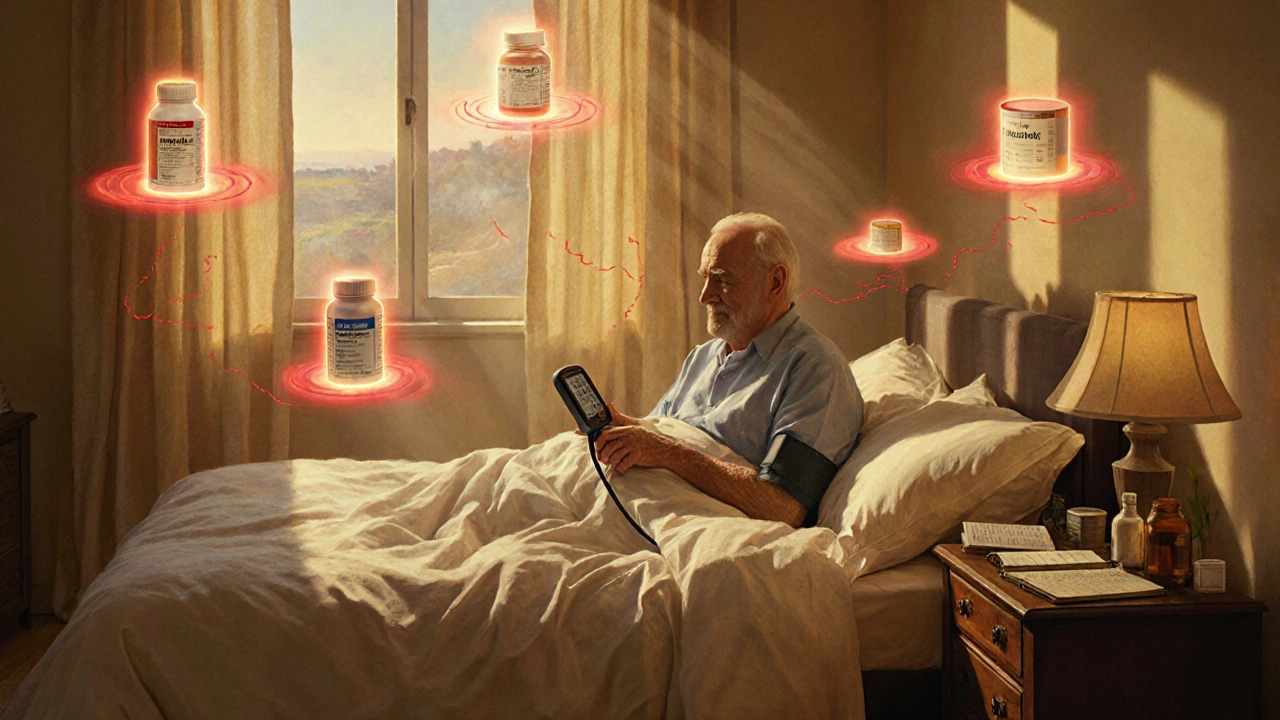Medication-Induced Hypertension Risk Calculator
Select Your Medications
Your Results
Select your medications to calculate potential blood pressure impact and receive personalized recommendations.
Many people assume high blood pressure is just a result of age, weight, or genetics. But what if your meds are the real culprit? Around 2-5% of all high blood pressure cases come from medications you’re already taking - and most people don’t realize it. The American Heart Association estimates that 15 to 20 million Americans each year have their blood pressure pushed up by something they took for pain, congestion, depression, or even a chronic illness. And the worst part? These spikes often happen slowly, silently, and without warning.
What Medications Are Actually Raising Your Blood Pressure?
It’s not just the obvious ones. You might be surprised to learn that common over-the-counter painkillers like ibuprofen (Advil, Motrin) can raise your systolic blood pressure by 5 to 10 mm Hg in just two weeks - especially if you already have high blood pressure. A 2022 meta-analysis found that about 12% of hypertensive patients saw a dangerous jump after regular ibuprofen use. Naproxen (Aleve) is a bit gentler, but still not safe for long-term use if you’re at risk. Corticosteroids like prednisone are even more aggressive. At doses above 20 mg per day for more than four weeks, up to 60% of users develop high blood pressure. One study showed systolic pressure rising by as much as 15 mm Hg within 24 hours of starting high-dose steroids. That’s not a side effect - it’s a direct physiological reaction. The body holds onto sodium, swells with fluid, and blood vessels tighten. Your heart has to work harder, and your BP climbs. Antidepressants like venlafaxine (Effexor) are another hidden trigger. At doses over 150 mg per day, these drugs can spike blood pressure in 8 to 15% of users. They work by increasing norepinephrine, which turns up your body’s stress response - and that includes tightening blood vessels. Even ADHD stimulants like Adderall or Ritalin can push systolic pressure up by 10 to 20 mm Hg in a quarter of users, especially older adults. Decongestants? Yes, those little blue pills in your cold medicine. Pseudoephedrine and phenylephrine cause immediate vasoconstriction. In a 2023 study, a single 60 mg dose of pseudoephedrine raised peripheral resistance by 25-30% within an hour. For someone with controlled hypertension, that’s enough to send readings into the danger zone. And if you’re taking multiple meds - say, an NSAID for arthritis, a decongestant for allergies, and an antidepressant for anxiety - the effects stack up. One study found 28% of patients with treatment-resistant hypertension were taking two or more BP-elevating drugs at once.How Your Body Reacts to These Drugs
Each drug messes with your system in a different way. NSAIDs block enzymes your kidneys need to flush out sodium. Without that, fluid builds up, your blood volume increases, and pressure rises. Corticosteroids mimic aldosterone - the hormone that tells your kidneys to hold onto salt and pee out potassium. That’s why people on long-term steroids often develop low potassium and swelling in their ankles. Decongestants activate your sympathetic nervous system - the same part that kicks in when you’re scared or running from danger. Your heart races, your arteries clamp down, and your BP spikes. Antidepressants like SNRIs prevent your brain from reabsorbing norepinephrine, so it floods your system. That keeps your blood vessels constricted and your heart pumping harder. Even herbal supplements aren’t safe. St. John’s Wort, often taken for mild depression, can interfere with blood pressure meds and raise pressure on its own. One patient reported a hypertensive crisis after taking it for months - no one warned them.How to Monitor Your Blood Pressure Correctly
If you’re on any of these meds, checking your BP once a year at your doctor’s office isn’t enough. You need consistent, accurate tracking. Start with a baseline. Measure your blood pressure at home for seven days before starting a new medication. Take two readings in the morning and two in the evening, and average the last six days. That gives you a real picture of where you stand. After starting the drug, check again at one and two weeks. Then every four to six weeks. If you’re on steroids or high-dose antidepressants, daily checks are recommended for the first month. Pay attention to orthostatic changes - if your blood pressure drops more than 20/10 mm Hg when you stand up, that’s a red flag for fluid shifts and possible complications. For high-risk patients - those with kidney disease, diabetes, or already elevated BP - ambulatory blood pressure monitoring (ABPM) is the gold standard. It tracks your pressure over 24 hours while you go about your day. The diagnostic threshold? A daytime average above 135 mm Hg systolic. That’s lower than the standard office reading, because it catches hidden spikes that clinic visits miss.
What to Do If Your BP Rises
The first step? Don’t panic. But do act. If possible, stop or lower the dose of the offending drug. For NSAIDs, switching to acetaminophen (Tylenol) usually brings BP back down within two weeks. In one head-to-head trial, celecoxib (Celebrex) raised BP by only 2.4 mm Hg, compared to 5.7 mm Hg with ibuprofen. That’s a big difference. For decongestants, switch to non-sedating antihistamines like loratadine (Claritin) or nasal sprays like fluticasone. For pain, try physical therapy, heat, or topical creams instead of oral NSAIDs. If you can’t stop the drug - say, you need prednisone for lupus or venlafaxine for severe depression - your doctor should start antihypertensive treatment. Calcium channel blockers like amlodipine or thiazide diuretics like hydrochlorothiazide are first-line. They work well against the sodium and vasoconstriction effects of these drugs. Beta-blockers? Avoid them. They’re ineffective here. A 2022 trial showed only 45% of patients responded to beta-blockers for drug-induced hypertension, compared to 72% with calcium channel blockers. Lifestyle changes help, too. Cut sodium to under 1,500 mg per day. Add potassium-rich foods like bananas, spinach, sweet potatoes, and beans - aim for 2,500 to 3,500 mg daily. Walk 30 minutes five days a week. These changes alone can drop your BP by 5 to 8 mm Hg.Why Doctors Miss This - And How to Protect Yourself
Here’s the harsh truth: most doctors don’t ask. A 2023 survey found only 22% of primary care providers routinely screen for NSAID use in hypertensive patients. Patients often don’t think of OTC meds as “drugs.” They take Advil for a headache, Sudafed for a cold, or St. John’s Wort for mood - and never mention it. On Reddit’s hypertension community, 68% of people said they were never warned about NSAIDs affecting their BP. On Healthgrades, patients reported waiting an average of 8.7 months before their BP spike was linked to their meds. You have to be your own advocate. Bring a full list of everything you take - prescription, OTC, supplements, herbal, even occasional use - to every appointment. Write it down. Don’t rely on memory. Ask: “Could any of these be raising my blood pressure?” One patient on Zocdoc shared how their doctor caught their BP was 160/100 because of a decongestant. Switched to a non-decongestant allergy med - and within three weeks, their BP returned to normal. That’s the power of a simple review.
What’s Changing in 2025
The tide is turning. The FDA now requires stronger blood pressure warnings on NSAID labels. The American College of Cardiology launched a free Drug-Induced Hypertension Calculator in 2023 - you plug in your meds, and it estimates your risk. Clinical trials are underway to test pharmacist-led medication reviews across 45 clinics. Early results show a 28% drop in uncontrolled hypertension when patients get help sorting their meds. The 2024 AHA/ACC guidelines will include new algorithms for managing BP spikes from corticosteroids, antidepressants, and stimulants. By 2030, the American Heart Association expects a 15-20% reduction in complications from drug-induced hypertension - if providers start asking the right questions.Bottom Line
High blood pressure from meds isn’t rare. It’s common, often silent, and usually fixable. The key is awareness - yours and your doctor’s. If you’re on painkillers, steroids, decongestants, antidepressants, or ADHD meds, monitor your BP closely. Don’t wait for a crisis. Ask the question: “Could this be raising my blood pressure?” Sometimes, the solution isn’t another pill. It’s just stopping one.Can over-the-counter pain relievers like ibuprofen really raise blood pressure?
Yes. Regular use of ibuprofen (Advil, Motrin) can raise systolic blood pressure by 5 to 10 mm Hg in people with existing hypertension. Studies show about 12% of hypertensive patients experience a clinically significant increase after just two weeks of daily use. Naproxen (Aleve) has a milder effect, but neither is safe for long-term use if you have high blood pressure. Acetaminophen (Tylenol) or celecoxib (Celebrex) are safer alternatives for pain relief.
How long does it take for blood pressure to return to normal after stopping a medication that causes hypertension?
It varies by drug. For NSAIDs and decongestants, blood pressure often drops within 2 to 4 weeks after stopping. Corticosteroids may take longer - up to 6 to 8 weeks - because the body needs time to reset its fluid balance. Antidepressants like venlafaxine usually show improvement in 3 to 6 weeks. Always monitor your BP during this time and don’t stop meds abruptly without consulting your doctor.
Are herbal supplements like St. John’s Wort safe if I have high blood pressure?
No. St. John’s Wort can interfere with blood pressure medications and may independently raise blood pressure. It’s been linked to hypertensive crises in patients taking it for depression without medical supervision. Always tell your doctor about any supplements you take - even if you think they’re “natural” or harmless.
Should I avoid decongestants completely if I have high blood pressure?
Avoid oral decongestants like pseudoephedrine and phenylephrine. They cause immediate vasoconstriction and can spike systolic pressure by 5 to 10 mm Hg within an hour. Instead, use saline nasal sprays, humidifiers, or non-sedating antihistamines like loratadine (Claritin) or cetirizine (Zyrtec). Some nasal steroid sprays like fluticasone are also safe for long-term use.
Why aren’t beta-blockers recommended for drug-induced hypertension?
Beta-blockers slow the heart rate but don’t address the main problem in drug-induced hypertension - vasoconstriction and sodium retention. A 2022 trial found only 45% of patients responded to beta-blockers, compared to 72% who responded to calcium channel blockers. Drugs like amlodipine or hydrochlorothiazide work better because they directly relax blood vessels or help flush out excess fluid.
What’s the best way to track my blood pressure at home?
Take two readings in the morning and two in the evening, sitting quietly for five minutes before each. Record all readings for seven days, then average the last six days’ numbers. Use an upper-arm cuff monitor, not a wrist or finger device. Check your BP before starting a new medication, then again at one and two weeks, and every four to six weeks after that. If you’re on steroids or high-risk meds, daily checks for the first month are advised.
Can lifestyle changes help reverse medication-induced high blood pressure?
Yes. Reducing sodium to under 1,500 mg per day, increasing potassium intake to 2,500-3,500 mg daily, and getting 150 minutes of moderate exercise per week can lower blood pressure by 5 to 8 mm Hg. These changes support the effects of stopping or switching meds and improve overall cardiovascular health. They’re not a replacement for medical advice, but they’re a powerful tool.


Jonathan Debo
November 2, 2025 AT 05:06Let’s be unequivocally clear: the normalization of NSAID use among hypertensives is a public health catastrophe. The data is unambiguous-ibuprofen elevates systolic pressure by 5–10 mm Hg, and yet, patients self-prescribe like it’s aspirin. The American Heart Association’s estimates are conservative; real-world data from pharmacy claims suggests up to 18% of uncontrolled hypertension cases are iatrogenic. And no, ‘just take less’ isn’t a solution-chronic low-dose exposure is insidious. The real failure? Clinicians who don’t ask about OTCs. They treat the symptom, not the source. It’s medical malpractice by omission.
Robin Annison
November 3, 2025 AT 12:35It’s strange how we treat medication as if it exists in a vacuum. We take pills for pain, for mood, for congestion-and forget they’re not neutral. They’re biochemical interventions. Each one alters a delicate system: sodium balance, vascular tone, neurotransmitter reuptake. The body doesn’t distinguish between ‘prescription’ and ‘OTC.’ It just responds. Maybe the real question isn’t which drugs raise BP-but why we expect our physiology to tolerate so many simultaneous chemical intrusions without consequence.
Abigail Jubb
November 4, 2025 AT 01:11I’ve been on prednisone for lupus for three years. My BP shot up to 180/110 within weeks. My doctor said, ‘It’s just a side effect.’ I said, ‘So you’re telling me to live with a ticking time bomb?’ I switched to azathioprine. My BP normalized. But here’s the thing-no one warned me. Not the rheumatologist, not the pharmacist, not even the damn website. They just hand you the script like it’s a candy bar. And now? I’m terrified of every new medication they throw at me. What else are they hiding?
George Clark-Roden
November 5, 2025 AT 15:39There’s something profoundly lonely about being the person who notices the quiet dangers. You’re the one who reads the footnotes. You’re the one who asks, ‘What does this do to my kidneys?’ You’re the one who tracks your BP at home while everyone else shrugs and says, ‘It’s just a headache.’ I’ve seen friends on antidepressants spiral into hypertensive crises because no one connected the dots. And when they finally do? The system doesn’t apologize-it just moves on to the next patient. We need more people who care enough to ask, ‘Could this be making me sick?’
It’s not paranoia. It’s precision.
Hope NewYork
November 5, 2025 AT 23:47Bonnie Sanders Bartlett
November 6, 2025 AT 05:03If you’re on any of these meds, please, just write them down. Every single one. Even the herbal tea you drink at night. Bring it to your appointment. Don’t say ‘I think I take…’-write it. Your doctor isn’t a mind reader. I used to forget my fish oil. Then my BP spiked. Turned out, the fish oil was interfering with my beta-blocker. Simple fix. But only because I wrote it down.
You don’t need to be a scientist. You just need to be organized.
Vrinda Bali
November 7, 2025 AT 06:35These medications are not the real issue. They are merely tools. The real enemy is the pharmaceutical-industrial complex that profits from chronic illness. The FDA’s new warnings? A PR stunt. The ‘Drug-Induced Hypertension Calculator’? A distraction. Behind the scenes, corporations fund studies that downplay risks. They lobby to keep OTC labels vague. They pay doctors to prescribe. And you? You’re the consumer, the lab rat, the statistic. Wake up. This is not medicine. It’s control.
John Rendek
November 7, 2025 AT 13:03Great post. I’ve been telling my patients this for years. The key is consistency: track your BP before and after starting any new med-even if it’s ‘harmless.’ One patient stopped her Sudafed, switched to saline spray, and her systolic dropped 18 points in three weeks. No new pills. Just awareness. Small changes. Big results.
Sonia Festa
November 9, 2025 AT 02:32bro i was on effexor for 2 years and my bp was through the roof. i thought i was just stressed. turned out it was the med. switched to citalopram and boom-normal. why the hell do docs not tell you this stuff before they give you a script? i feel like i got scammed. also, st. john’s wort? yeah that stuff is wild. my aunt went to the er after taking it with her bp med. like… why is this even legal??